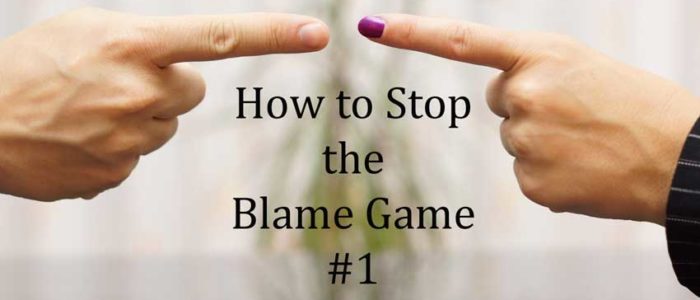How to Stop the Blame Game #1
I recently had a mentor ask me how to stop a couple from blaming each other. I asked her to explain to me what was happening.
Jim and Jane (not their real names) were stuck. They were stuck in a constant blame – defend cycle. Both of them would point the finger at each other and rattle off all the things their partner was doing wrong. The arguments would escalate and neither of them was happy.
This is a very common cycle.
For the mentor, it’s difficult to know how to deal with it. As mentors, what can we do?
First, know that this is very normal. This goes back to Adam and Eve and the very first sin. Adam blamed Eve and God. Eve blamed the serpent.
Our normal reaction is to protect ourselves by moving the fault to someone else. I’m not saying this is healthy, just that it’s typical.
It gets more complex in relationships when there is usually some fault on both sides. We tend to defend our own actions and blame someone or something else. I say this to couples because I don’t want them to feel that they have to hide their poor communication habits. They certainly don’t need to be judged for their poor behaviors.
It’s easy for mentors to tell the couple that this is poor behavior instead of helping them to see it for themselves. Telling them not to blame one another probably won’t go over well. They need something more.
Help the Couple Recognize the Pattern
Most couples know that they aren’t communicating well. They just don’t know what to do about it.
I like to focus on the process of the interaction, not the specific problem. I usually call this out to the couple. For example, if the problem is that one of the spouses is working late, I focus on how they talk about it. At this point, I’m not trying to solve for working late.
Here’s how this could go:
Mentor: “I know that you argue about Jim’s work schedule. I’d like to understand how you talk about this, rather than trying to solve the problem.”
Susan: “Jim is always at work. He doesn’t care about me at all. Even when I ask him to come home on time, he just ignores me.”
Jim: “When I do come home, you just nag me all the time. It’s really your fault. If you were nicer to me, then I’d want to be around you.”
Mentor: “It sounds like you’re both very frustrated about this.”
Susan: “Yes, I think that’s putting it lightly.”
Jim: “I agree.”
Mentor: “So, I’m seeing a pattern here. Susan, you complain that Jim isn’t at home and you criticize him for it. Jim, you react by counter criticizing. Is that right?”
Jim and Susan: “Yes, that’s what we do.”
Mentor: “Then what happens?”
Jim: “I get tired of hearing about it and I leave the room.”
Susan: “That just demonstrates that he doesn’t care for me.”
Mentor: “So you both criticize each other, eventually Jim leaves the room and Susan feels uncared for.”
Jim and Susan: Both nod
So, what’s happened?
You’ve identified the pattern and they both agree to it. I know that, in the real world, it may not happen this quickly, but this is an example of how to identify the pattern.
The couple may still be blaming each other, but you’ve redirected their focus from blame to understanding their pattern of conflict.
Tips for Marriage Mentors:
- Validate the hurt – Couples blame each other because they are hurt. Validate their hurt. You don’t have to agree with them, but the hurt is real.
- Pick a disagreement that isn’t current – Sometimes a current disagreement will be very emotional. Ask them about something that happened in the past where they won’t have as many emotional triggers.
- Reframe the conversation – Focus on the pattern of blame and criticism. People can get very entrenched in their view of what’s right. Help them to shift the focus to their patterns.
Other posts you may like:
How to Stop the Blame Game #2
How to Stop the Blame Game #3





This will be so helpful for our couples group. Thank you for these great conversation starters.
I’m glad that you are finding them valuable!
It sounds as if you use a lot of motivational interviewing during your sessions with the couples.
Thanks for the comment. I haven’t been trained in the official motivational interviewing, but from what I understand it does sound similar. My approach has come from reading and from experience with couples as a lay person.
From the little that I have read on motivational interviewing, it sounds like sales questioning. I have had a great deal of experience in sales questioning for the last 30 years. It deals with helping people think through the cost of the status quo vs. the benefit of changing. That sounds like the same approach to me.
As always, I want to be Biblically based, psychologically sound and effective.
Do you use motivational interviewing and would you recommend it as a resource?